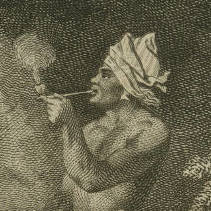Tired of the oppression that his people suffered in the hands of the British due to the massive turn of the slave trade, Joseph Chatoyer, chief of an indigenous group of the Caribbean led what is now known as the first and second Carib Wars which lasted between 1769 and 1797.

Joseph Chatoyer, popularly known as Joseph Satuye or just Satuye was the Chief of the black Caribbeans who identify as the Garifuna people. The Garifuna are the indigenous Caribbeans who inhabited the land which is now St Vincent and Grenadines before the British laid claims to the island in 1672.
By the time of Joseph’s rule, the people had mixed with the enslaved Africans mostly from West and Central Africa and it is possible that Joseph himself was of African origin either fully or partly.
During the early years of slavery on the island of St Vincent, the British pushed to take control of the Garifuna people and their lands which would then give them control over the whole island eventually. By the 1700s, several Garifuna had been captured into slavery to join the enslaved Africans or were expelled from their lands.

The first Caribbean War started in 1769 with several disputes after rising tensions between the indigenous people and the British who were trying at all cost to take over the Garifuna people and eventually have full control over the island. However, in 1772, Chief Joseph Chatoyer led his people in a severe battle with the British forces in the region.
The battle frightened the British and led to the signing of a peace treaty in 1773 that would make sure that the Britsih leave the Garifuna people alone and the two parties could live in harmony but that was not the end of Britain’s attempt.

The British had crossed the line and overlooked the treaty in several ways by 1795 and could not be stopped or approached. Angered by their inability to keep to their end of the deal, Chief Joseph encouraged his people to fight the British in another battle.
The Second Carib War began on March 14, 1795, led by the brave and mighty chief. Unfortunately, on the very first day of the Second Carib War, Chief Joseph lost his life after he was killed by Major Alexander Leith who worked under the British forces led by General Ralph Abercromby at Dorsetshire Hill, according to several sources.
Despite his death , the Second Carib War continued until 1797 . Chief Joseph’s death attracted the French who had themselves lost the island to the English and made them support the indigenous people in the war .
His death angered his people leading them to fight more fiercely and manage to take over a great part of the island until 1797 when
General Ralph Abercromby and his men defeated the Garifuna causing the people to lose their lands, be deported to Roatán close to present-day Honduras.
For his braveness and leadership, Chief Joseph Chatoyer is not only celebrated in St Vincent and Grenadines but also in several countries such as Costa Rica, Haiti and Belize.

The life of this great chief that once lived is not majorly documented or written in history. In 1823, William Henry Brown who is considered the first known black playwright in the USA wrote and staged a play The Drama of King Shotwaway based on the true life of Chief Joseph Chatoyer. It is also known as the first play written by a black man in the USA.
After the Second Carib War, the Garifuna people, who to this day still pay homage to their chief and warrior, spread all over Central America when they were deported from St Vincent island. It was then that they became officially known as the Garifunas.
There is also a national park named in his honor in St. Vincent and Grenadines.










